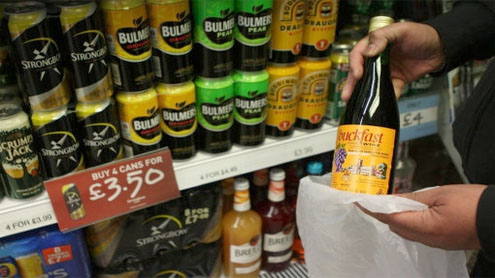
David Cameron’s plans to outlaw cheap alcohol are likely to backfire as supermarkets will be encouraged to “sell more, not less” drink, the Office of Fair Trading has warned.
The watchdog is concerned there will be harmful “unintended consequences” if the Coalition presses ahead with plans to impose a minimum 40p price per unit of alcohol.Its biggest concern is that shops will have an “incentive” to promote their cheapest ranges of drinks because they will benefit from higher margins on these products.In evidence to MPs, the watchdog said supermarkets and the drinks industry would gain “additional profit for every unit of low-cost alcohol that they sell”.
The OFT is also worried that the Government’s interference in prices will set a dangerous precedent, undermining the free market. It found similar price controls in France and Ireland meant households had a higher cost of living.“By legitimising intervention to control prices in a competitive market, it will be harder for the Government to resist calls for similar measures in other parts of the retail sector in future,” the OFT warned in evidence to the health select committee.
The watchdog’s opposition will be a serious blow to a key policy for the Prime Minister and Theresa May, the Home Secretary.The drinks industry and competition lawyers have also warned that the move could be illegal under European legislation.The Government announced proposals to ban cheap alcohol in March after Mr Cameron became concerned about the “scourge of violence” caused by binge drinking. Estimates suggest a 40p minimum per unit could result in 50,000 fewer crimes per year.
Senior doctors, including Sir Ian Gilmore of the Royal College of Physicians, have also said that the plan could save 10,000 lives a year by making alcohol more expensive for heavy drinkers. The changes will mean that a bottle of wine cannot be sold for less than £3.60, a can of lager will cost at least 80p, and a bottle of spirits between £10.40 and £11.20.The Coalition is following the lead of Scotland, which decided to impose a minimum price last year. The Scottish administration is already facing a legal challenge from the Scotch Whisky Association.
The trade body has also lodged a complaint with the European Commission, claiming the move breaches free trade laws.The commission said earlier this year that it believes “minimum tax rates to be preferable to minimum pricing for alcohol”.The OFT also believes a straightforward tax per unit would be better than minimum pricing, as this would not encourage supermarkets to sell more alcohol.The Home Office is due to give more details about its plans for minimum pricing in the autumn. A spokesman yesterday declined to comment on the OFT’s concerns. – Telegraph












